I flew from Tel Aviv, Israel to Munich, Germany. I flew because leaving Israel to the north by land really is impossible. It would involve going through either Lebanon or Syria, neither of which have diplomatic relations with Israel. Neither country would let me enter anyway because of the Israeli stamp on my passport. Neither even country recognizes the state of Israel. I flew to Munich Germany because it was a cheap flight on one of the few discount airlines serving Tel Aviv. I checked on rates to Istanbul, Turkey and Athens, Greece. Those flights were quite expensive (at least $400 one way), even though they were much closer to Tel Aviv. Only two discount airlines fly from Tel Aviv. I could only get to Germany or Riga, Latvia for less than $200. Since I wasn't really sure where in Europe I was going, I chose Munich because it was fairly centrally located and I really wanted to see the Bavarian Alps of Southern Germany.
I got into Munich about 5:00am and took the train from the airport into the city. I couldn't check into my hostel until 3:00. It was still really early. I had breakfast, checked my email, wrote a bit of my blog, and it was still really early. I was about to fall asleep and decided I needed to get out and do something.
I walked around central Munich. Munich is a beautiful city. It was mostly leveled during WW2 and was rebuilt almost exactly the way it was prior to the war. I found a free walking tour by the same company that did the tours in Jerusalem. It wasn't as good as the Jerusalem tour. The tour guides had this sort of weird energy and were kind of annoying.
The Glockenspiel in Marienplatz. Three times a day the bells ring and the statues go around in a circle. There is always a large crowd of people gathered to see this happen, but it is really nothing special and is a pretty big letdown.


Other pics from Marienplatz.



There were tons of biergartens and outdoor cafes with people drinking beer at noon on a weekday. Beer drinking is very ingrained in the German culture and they usually drink it by the liter. German law stipulates that German citizens have the right to drink up to a liter of beer at lunch without suffering repercussions. I can't imagine drinking a liter of beer at lunch and then going back to work.
On June 12 I took a tour to the Bavarian Alps and Neuschwanstein Castle. The German language is kind of funny in that you see a lot of really long and complicated words, but they're really just 3 or 4 words combined together. Neuschwanstein translates to English as New Swan Stone. The scenery on the way to Neuschwanstein was absolutely gorgeous. Everything looked perfect. Not a single house, mountain, street sign, or even a blade of grass seemed out of place. This is real storybook, Grimm Brothers territory.

The first part of the tour was a bicycle ride around Swan Lake.

 The trip included time for a swim in Swan Lake. However, it was a bit brisk that day and it was, after all, an Alpine lake, so only two people jumped in. Me being one of them. The water was really, really cold and, needless to say, it was a short swim.
The trip included time for a swim in Swan Lake. However, it was a bit brisk that day and it was, after all, an Alpine lake, so only two people jumped in. Me being one of them. The water was really, really cold and, needless to say, it was a short swim.Neuschwanstein Castle is thought to be the inspiration for the castle at Disney World. It was built on a mountain in southern Germany between 1869 and 1886 for King Ludwig II. The king was an interesting figure. He was obsessed with Richard Wagner and much of the castle design was an homage to him. The King died under mysterious circumstances before it was completed and it was opened to tourists just a few months after his death.







Typical Bavarian building in a town near the castle.

On the night of June 13 I went to a few beer halls with some people I'd met at the hostel. I don't remember any of their names. Beer in Germany is, it goes without saying, quite tasty. These beer halls and biergartens are huge and packed. The most famous beer hall is the Hofbrau House. I can't imagine what Munich must be like during Oktoberfest.



The guy in the pic below to my immediate right threw up all over the table. He was American. Young Americans seem to have a hard time holding their alcohol. We get a later start than our European and Australian counterparts.

 The people I met traveling in Western Europe tended to be younger, and on shorter trips. This makes sense as first trips to Europe are usually Britain, France, Germany, and Italy and not Serbia, Bosnia, or Romania. They also tended to have this weird energy that I found off putting. I had a few "I'm getting too old for this shit" moments in Germany and Austria. I decided I would spend most of this leg of my trip in Eastern Europe. In addition to the travelers being a bit more mature and laid back, things are quite cheaper than in Western Europe. It always surprises me how much things cost in Western Europe. The prices are marked in Euros and at first glance, look reasonable. But the price has to be multiplied by 1.42 to get the price in US dollars. Also, Eastern Europe is in a transitory period now and I wanted to see it before things changed too drastically. Scotland, France, Scandinavia, etc., will look about the same in 20 years as they do now. My immediate plans were to travel to Salzberg, Austria, and then to Budapest, Hungary.
The people I met traveling in Western Europe tended to be younger, and on shorter trips. This makes sense as first trips to Europe are usually Britain, France, Germany, and Italy and not Serbia, Bosnia, or Romania. They also tended to have this weird energy that I found off putting. I had a few "I'm getting too old for this shit" moments in Germany and Austria. I decided I would spend most of this leg of my trip in Eastern Europe. In addition to the travelers being a bit more mature and laid back, things are quite cheaper than in Western Europe. It always surprises me how much things cost in Western Europe. The prices are marked in Euros and at first glance, look reasonable. But the price has to be multiplied by 1.42 to get the price in US dollars. Also, Eastern Europe is in a transitory period now and I wanted to see it before things changed too drastically. Scotland, France, Scandinavia, etc., will look about the same in 20 years as they do now. My immediate plans were to travel to Salzberg, Austria, and then to Budapest, Hungary.On June 14 I left Munich and took a two hour train ride to Salzberg, Austria. Salzberg is a small, beautiful, remarkably well-preserved city in the Austrian Alps, famous for being the birthplace of Mozart and the setting for The Sound of Music.













On June 15, I went on a Sound of Music tour that went to most of the filming locations as well as other locations pertinent to the real Von Trapp family. I know a Sound of Music tour doesn't sound like the most manly way to spend a day. It would be easy to say that I only went on the tour because two cute American girls, Stephanie and Jillian, I'd met the night before were going. But I really wanted to go on this tour. Many of the images in my head of Europe come from the Sound of Music. The tour, led by a very funny Scotsman, was very entertaining and included a lot of trivia about the movie, differences between the movie and the real Von Trapp story, and what has happened since the filming.
The Sound of Music is based on the real lives of the Von Trapp Family Singers and for a Disney movie-musical, stays reasonable true to the real story. Maria Augusta was really studying to be a nun and was sent to be a governess to a wealthy local Naval Commander's seven children. The children took a liking to her, they married, and fled Austria prior to the Nazi annexation of Austria. There were a few changes made for the movie for dramatic effect which I will discuss later.
Also on the tour was a family of three from Mumbai, India. It occured to me that if I think Austria is an expensive place, then these people must really think things are expensive. I went from paying about $4-$6 per night for a hotel with private bath in India to paying $30-$35 for a hostel bed in Germany and Austria. A cup of tea in India was about 20 cents. Here I had one for about $3.
The tour started and ended in Mirabell Park in central Salzberg. This is where the Song "Do-Re-Mi" ended. Through the magic of movie making, the song began in a meadow about 40 kilometers outside Salzberg. Maria and the kids learn to sing, ride bicycles, take a horse carriage ride, and make it all the way to Mirabell Park in downtown Salzberg all in the span of about six minutes.
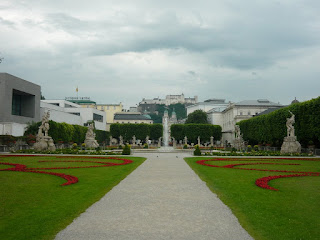



The house where the scenes of the back of the house were shot. It is now a conference center. The actress playing Gretl nearly drowned here when all the children fell out of a boat. No one knew she couldn't swim.



The gazebo where the exterior shots of the "16 Going on 17" were filmed.
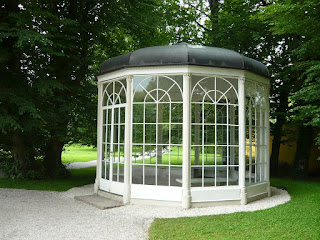

All of the interior shots were filmed in a studio in Hollywood. Only external shots were filmed in Austria. The gazebo was built for the movie and was originally located on the grounds of the building in the previous photo. The owners liked the gazebo and decided to keep it there. But there were too many instances of people who were 16 going on 42 sneaking in and night, dancing around, and injuring themselves. The gazebo was eventually moved to a park a few kilometers from the original location and usually remains locked.
The road where Maria, with her guitar and suitcase, skips and sings "I Feel Confident" on her way to the Baron's house.
 Mondsee is a town a few miles from Salzberg. The wedding scene was filmed in the Mondsee Cathedral.
Mondsee is a town a few miles from Salzberg. The wedding scene was filmed in the Mondsee Cathedral.
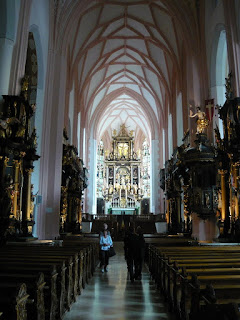
 An actual collection of skeletons adorns the front of the cathedral.
An actual collection of skeletons adorns the front of the cathedral. Some other scenery near Salzberg. It was incredible.
Some other scenery near Salzberg. It was incredible.

Ok, a few more things and I'll stop talking about the Sound of Music. A few differences between the movie and the real Von Trapps:
1. The Von Trapps had been married for ten years and had three kids of their own before they fled Austria. The Baron considered joining the Third Reich, but decided against it.
2. They did not flee over the montains into Switzerland. They took the train to Italy. In fact, although Switzerland does border Austria, it is nowhere near Salzberg. In reality, crossing the mountain as they did in the movie would have put them in Germany and they would have walked right by Hitler's summer home.
3. The Baron was not the cold, hard disciplinarian, as he was portrayed in the movie. The family always denied this.
4. The childrens' real names were Rupert, Agathe, Maria, Werner, Hedwig, Johanna, and Martina.
The family moved to London, then to America before eventually settling in Stowe, Vermont. They were nearly penniless when they left Austria due to the failure of an Austrian bank in which he kept most of his money.
After the tour we went to the Hohensalzberg Castle. This is the castle on the hill in the background of the below pic.
 Views of the city from the castle.
Views of the city from the castle.

The Castle.

The hostel I was staying at had a nightly showing of the Sound of Music. I was excited to see it after being on the tour earlier. I had never seen the movie all the way through and had no idea that there was this Nazi subplot. I sat down to watch it with Stephanie and Jillian. We got kind of bored after an hour and decided to go to a pub down the block. I still haven't seen the movie all the way through.
On June 16, I took a train to Budapest, Hungary. It's kind of hard to read in the below pic, but the monitor indicates the speed of the train is 253 km/hour (157 mph). I know there are trains in Japan that go faster, but that's pretty damn fast. It's the fastest I've ever traveled on the ground.

The Salzberg train station. I love all the old train stations in Europe and the fact that they are still being used as train stations.

The Budapest train station.
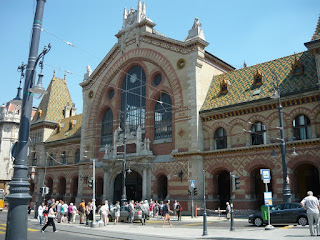 Budapest is a great city. It has very little of the ugly, grey, rectangular, Soviet era archetecture that (I would later find) dominates the former Soviet controlled countries. It is a good transition from Western Europe to Eastern Europe.
Budapest is a great city. It has very little of the ugly, grey, rectangular, Soviet era archetecture that (I would later find) dominates the former Soviet controlled countries. It is a good transition from Western Europe to Eastern Europe.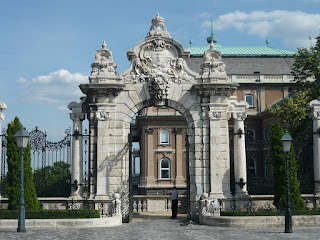

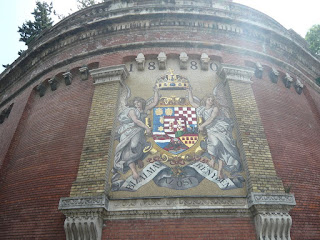

The Danube river separates Buda and Pest, the two main parts of the city. Buda is hilly and Pest is rather flat.

I stayed at Tiger Tim' place, a newer hostel in Budapest. It was one of my favorite hostels on the trip. The staff took everyone out to bars and clubs every night. It was great for the three days I spent there, but I can't imagine working there and doing it all the time. I like going out with locals to local restaurants and bars. It is a much better way to experience a place. As a tourist, I only know what is in the Lonely Planet, which usually runs a few years behind. And when places get a Lonely Planet mention, their quality tends to stagnate or suffer because of the automatic traffic the write-up brings in. Budapest is a great city, by the way, for nightlife. And fairly inexpensive.
Bath's are a big part of Hungary. The Szechenyi bath is one of the biggest and oldest. It has many pools, both indoor and outdoor, heated at different temperatures and is filled with people of all ages (well, ok, mostly older people). The waters are thought to have healing properties. They felt pretty good after a few nights on the town.



 Hungarian Parliament building.
Hungarian Parliament building.
St Stephen's Basilica.

Inside St. Stephens is the Basilica of the Holy Right Hand, which contains the mummified right hand of St. Stephen.


Pics of the city from the top of St Stephens.
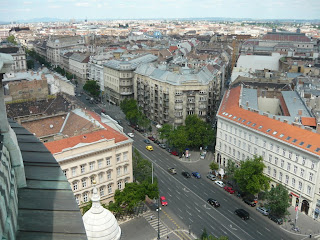



 On June 19, I took an overnight train from Budapest to Belgrade, Serbia.
On June 19, I took an overnight train from Budapest to Belgrade, Serbia.
